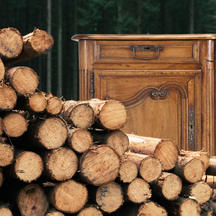Posted by Old Plank Antiques on Sep 11th 2024
Sustainable Living: The Environmental Benefits of Choosing Reclaimed Wood
In an era where sustainability is at the forefront of our environmental consciousness, the choices we make in our daily lives have significant impacts on the planet. One such choice that’s gaining traction is opting for reclaimed wood. At Old Plank, we believe in the beauty and sustainability of reclaimed wood, and we’re excited to share how choosing this eco-friendly option can contribute to a greener, more sustainable world.
1. Reducing Waste and Preserving Resources
Reclaimed wood is salvaged from structures such as old barns, factories, and warehouses. By repurposing this material, we prevent it from ending up in landfills, where it would contribute to waste and decomposition. Instead, reclaimed wood is given a new lease on life, preserving valuable resources that would otherwise be discarded. This practice not only reduces waste but also lessens the demand for new lumber, which in turn helps conserve forests and natural habitats.
2. Lowering Carbon Footprint
The process of manufacturing new wood products involves significant energy consumption and greenhouse gas emissions. From harvesting trees to processing and transporting them, the environmental impact is substantial. Reclaimed wood, however, requires minimal processing. By reusing existing wood, we significantly reduce the carbon footprint associated with producing new furniture. This small yet impactful choice helps to lower overall emissions and promotes a more sustainable lifecycle for wood products.
3. Preserving Historical and Cultural Value
Each piece of reclaimed wood carries with it a unique history and character, reflecting the time and place from which it originated. By repurposing these materials, we honor and preserve the historical and cultural significance of the original structures. This not only adds value to the furniture but also promotes a sense of connection to the past, contributing to a more mindful and meaningful approach to home decor.
4. Promoting Biodiversity
Forestry practices for new lumber often involve clearing large areas of forest, which can lead to habitat destruction and a loss of biodiversity. By choosing reclaimed wood, we help mitigate these effects. Reclaimed wood comes from structures that have already been built, thus reducing the pressure on forests and protecting wildlife habitats. This choice supports ecological balance and contributes to the conservation of biodiversity.
5. Supporting Local Economies
Reclaimed wood is often sourced locally, which helps support local businesses and artisans. By investing in reclaimed wood furniture, you’re contributing to the local economy and promoting sustainable practices within your community. This support helps to create jobs and fosters a culture of sustainability, reinforcing the importance of eco-conscious choices in all aspects of life.
6. Enhancing the Longevity of Furniture
Furniture made from reclaimed wood is typically robust and well-crafted, often due to the quality of the original materials. Many of these pieces have already stood the test of time, demonstrating durability and longevity. Investing in reclaimed wood furniture means you’re not only choosing a sustainable option but also one that offers lasting value and reduces the need for frequent replacements.
Conclusion
Choosing reclaimed wood is more than just a design decision; it’s a commitment to environmental stewardship and sustainability. By reducing waste, lowering carbon footprints, preserving history, protecting biodiversity, supporting local economies, and investing in durable products, reclaimed wood plays a crucial role in sustainable living.
At Old Plank, we’re proud to offer a range of reclaimed wood furniture that embodies these principles. When you choose our pieces, you’re not only adding a unique touch to your home but also contributing to a healthier planet. Embrace the beauty of reclaimed wood and join us in making a positive impact on the environment, one piece of furniture at a time.

